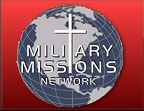General Order #1 which prohibits deployed service personnel from “proselytizing” supports good theology. Christians never convert anybody anyway. It’s God that does the converting.
Jesus tells his disciples they will “be” witnesses to the ends of the earth, not that we will “do” witnessing (Acts 1:8). Paul says “some” are called to be evangelists, not everyone (Eph 4:11). The job of every Christian soldier in Afghanistan is to “be” a testimony, not to “do” evangelism. “Being a testimony” does not violate General Order #1.
In its original Greek language, Jesus’ Great Commission (Mat 28:19-20) literally says, “as you are going” (participle) “disciple” (main verb) “the ethno-linguistic groups” (direct object). The command is not to disciple individuals on a one-on-one basis like we individualistic Americans like to think about it. The command is to disciple whole ethno-linguistic groups. “Baptizing” and “teaching” (more modifying participles) are functions of the church not individuals.
The Great Commission is basically a command to transform whole communities at a time and is not restricted to one-on-one evangelism. Such a mission is a multi-disciplined or “combined arms” process requiring people with many different gifts and callings. The soldiers, with stability operations and a good testimony, are contributing to the combined effort of transforming whole communities in Afghanistan and Iraq.
General Order #1 prevents soldiers from distributing Bibles in local languages, but it does not prevent people who are not soldiers (i.e. returning Afghan refugees) from translating, distributing, and teaching God’s word in a newly stabilized environment.
So what can soldiers “do” under General Order #1 to faithfully “be” witnesses and contribute to community transformation? For more Dos and Don’ts see the Dos and Don’ts for Deployment page.







 http://www.faithandwar.org
http://www.faithandwar.org Mark Durie's Blog
Mark Durie's Blog Military Missions Network
Military Missions Network The Christian Fighter Pilot
The Christian Fighter Pilot The Navy Christian
The Navy Christian